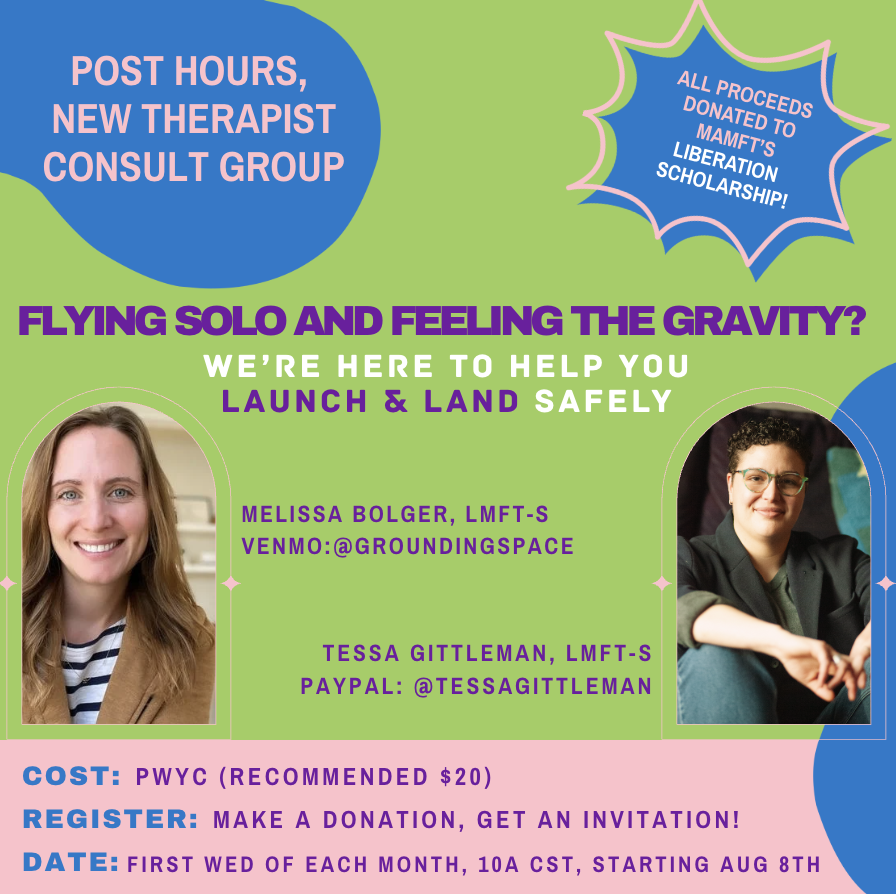Stuff Bonus
Stuff Bonus
Starting in August, 2025, and continuing the first Wednesday of every month at 10am…
join Tess and Melissa Bolger for a consult group just for newly licensed, or about to be licensed, therapists to get support. Want to join? Make a donation to Tess or Melissa and get an invitation! All proceeds go to MAMFT’s Liberation Scholarship.
Trainings
-

Supervising + Surviving Within Broken Systems
This training first launched in-person on 1/17/25 and it sold out! In our second edition, we have incorporated the feedback and found an amazing, accessible space in Roseville, MN.
On August 8th, 2025, from 9:30-4:30, join Tess & Jessi Leader, as they explore how to navigate broken systems for both the supervisors ourselves and alongside our supervisees. This training will cover essential topics such as ethics, cultural humility, and legal statutes through the lens of liberation, embodiment, and community. Expect a day filled with experiential learning, including small and large group discussions, role play, embodiment practices, and creative expression.
-

Early Career Launch Pad
Join Tess and Heather Heide, LMFT-S, on Saturday, September 13th, 2025, in-person (location TBD), for all the things you wish you’d learned in school, at your site, or during supervision!
The truth is, graduate programs and clinical placements can’t cover everything it takes to feel grounded, confident, and sustainable as a new therapist. We know this firsthand—as educators and private practice owners, we’ve seen where new clinicians thrive and where they struggle. That’s why we created this day: to offer the kind of practical, real-world tools and support we wish we had when we were starting out.
-

Biological (and Technological) Bumper-Lanes: A New Framework for Managing “Self of the Therapist’ in Session
On October 24th, 2025, from 1:30 - 3:30 pm, join Tess & Tai Mendenhall, LMFT, Ph.D. as we reframe what self-care can be for clinicians.
In this training, you will learn about how technology can assist you in mitigating, as well as recovering from, burnout. You will be invited to think about how weaving this technology into the foundation of your clinical training will help your optimization of sustainability, self-awareness, and innate knowledge as a part of effective, intuitive, and ethical practice. The presenters will also advance hypotheses about how reframing understanding of our work, both for new and practicing helping professionals, and from a passive learning to active engagement (like the ongoing performance of an athlete) will help clinicians survive an increasingly uncertain world (professionally and personally).
-

The Other Compulsive Disorder
Obsessive-Compulsive Personality Disorder (OCPD) is one of the most common personality disorders in the US, affecting 3-8% of the US population. Despite its prevalence, it is often eclipsed in education, research, practice, and culture, by other personality disorders, like Borderline Personality Disorder, which affects 1.4%, or its clinical cousin, Obsessive-Compulsive Disorder (OCD), which affects 2-3% of the US population. This discrepancy leaves clinicians under-prepared to support people and relationships impacted by the unique set of issues that OCPD brings forth. You don’t have to be intimidated by it… much like the clients themselves, you can learn how to manage it!
-

Contracting for Polyamory
Have you ever wondered how to help clients open up their relationship? Or do you work with non-monogamous clients and notice feeling drained in the process of endless shifts in a relationships’ agreements, boundary enforcement, and can't shake the feel like they keep looking to you to be the judge, jury, and mediator? Your facilitators for the day, Tess and Cara Mielke, GET IT. That’s why they put together a 6 CEU event for BSW, BBHT, and BMFT (with 1 Cultural Competency and 1 Ethics), where you'll get less “boring lecture” and more “get your hands dirty” learning.
-

Ambivalence (Why it Matters)
Ambivalence and Polarity Management: Why the world today pushes us into more values conflicts than ever, leading to chronic ambivalence, subsequent and chronic burnout, and create the perfect conditions for moral injuries across home, work, and even therapy.


